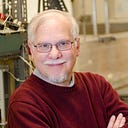I am a geologist (Really!)

On April 17 CNN reported that Interior Secretary Ryan Zinke has publicly referred to himself as a “geologist” at least 40 times, including in front of Congress. This claimed credential has been used to confer credibility to his statements involving a range of topics, such as the presence of oil or gas in the Bears Ears National Monument. As CNN pointed out, however, although Zinke indeed majored in geology at the University of Oregon, that was 34 years ago, and he never worked in the field or obtained an advanced degree in it. This fragile claim of being a geologist has added fuel to the fire already created by his decisions. Others, including John Oliver, have already called him out on this. What I want to address here is the broader question of how we label ourselves professionally and, by implication, what kinds of expertise can one claim.
In my mini-bio at the top of this page, I call myself a “paleontologist, geologist, ecologist, educator.” I very carefully decided on this choice of words and their order and I can justify them all. Paleontologist is the easiest; it is my major area of research and teaching and I have been involved with it since I was an undergraduate in 1973. I can also certainly claim geologist; all of my degrees are in geology departments and I have taught and published papers in geology journals. Ecologist is a bit more of stretch; although I have no degrees in the field, I have had training in the science and have published a number of papers in the ecology literature. And I am proud to call myself an educator; I have been a teacher for my entire career.
Beyond this I am hesitant to go. I have published in a physics journal, but I would not call myself a physicist. And although I am broadly trained in geology, my expertise is in paleontology and related areas of Earth history. I would be the last one to claim that I could help you find oil or rare minerals or describe in detail the workings of volcanoes or the chances of an earthquake striking Seattle. I would even be reluctant, given that I am an invertebrate paleontologist, to discuss with authority our current knowledge of dinosaur relationships. What I do have is a pretty good chance of understanding someone who does have that knowledge. To do so has required an active effort to keep up with current knowledge not only in my own fields, but those that my colleagues work in. When I teach new science that is not mine, its credibility depends on my ability to understand and explain it, not because I did the work myself.
It is with this lack of current knowledge and engagement where the real issue of Zinke’s assertions lie. There is no evidence that he has engaged with geology in the decades since he received his bachelors. Thirty-five years is a long time in any field; knowledge advances, opinions change, new facts are gathered. It would have been far better for Zinke to have said, “I have consulted with geologists in this matter, and my past training in the science allows me to appreciate what they tell me.” Credibility comes from current expertise; there is no shame if it comes from elsewhere if you are prepared to understand it.
